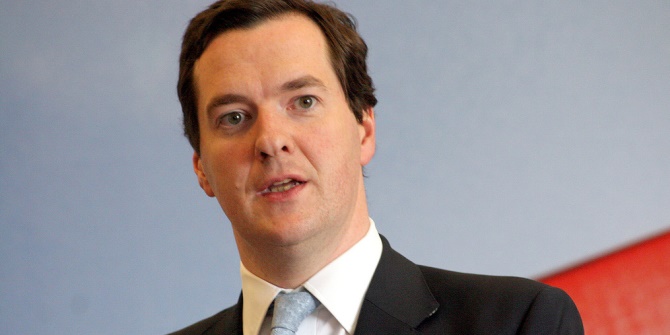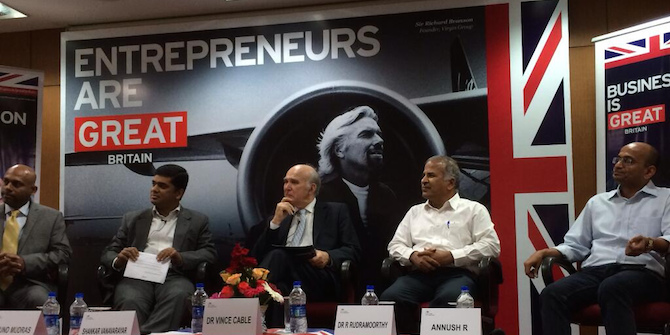 British politics is set to enter a new era following the death of Queen Elizabeth II and the appointment of Liz Truss as prime minister. Anthony Salamone assesses the potential implications of these changes for Scotland and the debate over Scottish independence.
British politics is set to enter a new era following the death of Queen Elizabeth II and the appointment of Liz Truss as prime minister. Anthony Salamone assesses the potential implications of these changes for Scotland and the debate over Scottish independence.
This September has proven to be a time of change for the UK. The passing of Queen Elizabeth II, still weighing on many minds, has overshadowed what otherwise would have been the signature news this month: the installation of Liz Truss as the new prime minister.
In the space of several days, the UK, remarkably, witnessed a change of both its head of state and head of government. Each of these significant changes, in distinct ways, will influence Scotland and its politics – including the Scottish independence debate. At this stage, the pertinent question is therefore the extent of that influence, in both respects, on Scottish politics over the months and years ahead.
Change of monarch
The immediate consequences of the Queen’s death on 8 September, in Scotland, were obvious: Scottish politics in its normal form came to a halt. The Scottish parliament suspended its operations until 20 September (the day after the Queen’s funeral). Scottish political parties paused their constitutional arguments during that time.
In the days following the Queen’s death, world attention focused on Scotland, particularly on the related ceremonies in Edinburgh. For all its intensity, however, this period of reflection was temporary. It did not fundamentally change the existing divisions over whether Scotland should become an independent state or remain part of the UK. Those divisions were simply not discussed at their normal volume. Such is the nature of the debate on Scotland’s constitution today that no conceivable development would eliminate it.
The wider implications of the accession of Charles III as King remain unclear. It is possible that support for independence or for the UK union could wax or wane depending on how the Scottish electorate views the new monarch. His accession also vividly demonstrated the hereditary nature of having a monarch as the head of state.
Nevertheless, at this point, it seems more probable that most voters will base their opinions of independence on other considerations, such as the state of the economy, Scotland’s relationship with the EU, and energy and security concerns. Monarchy is a theme in the independence debate, but not a particularly defining one. In any event, supporters and opponents of monarchy exist on both sides, so any evolution of public sentiment on King Charles III in Scotland will not inherently change the balance of opinion on independence.
Nevertheless, republicanism is undoubtedly stronger on the pro-independence side. The Scottish Greens are a republican party and many supporters of the Scottish National Party (SNP) also want an independent Scotland to be a republic. In that context, it is all the more noteworthy that the SNP leadership maintains an avowedly monarchist image. The party’s position for the 2014 independence referendum, which has not changed, was that a Scottish state would be a monarchy, with the British monarch as the head of state.
Recent messaging from party leader Nicola Sturgeon and Westminster leader Ian Blackford in particular, taken at face value, gives a false impression that support for the monarchy is universal within the independence movement. In reality, the issue is a point of division, not unity, for proponents of independence. At the same time, the argument is more about the institution of monarchy than the personalities of Elizabeth II or Charles III. In that light, the change of monarch does not substantially alter the discussion.
Change of prime minister
By definition, the arrival of a new prime minister carries significant political ramifications. Today’s crises are evident – on inflation, energy, the Ukraine war, among others – and many will look to government for answers and action. Yet, as Liz Truss endeavours to lay the foundations for her premiership, the political environment in Scotland may prove difficult for her government.
The Conservatives currently hold 6 of Scotland’s 59 seats in the House of Commons (around 10 per cent). Polling suggests that both Liz Truss and her predecessor, Boris Johnson, are unpopular among Scottish voters (though Truss has a less negative favourability than Johnson). On Scottish independence, the prime minister has continued the long-running position that no referendum should happen in the foreseeable future. As ever, that debate has two dimensions: whether a referendum should be held and whether Scotland should become independent.
On the first dimension, the UK government has rejected the idea of holding a new independence referendum in the near term since it was first formally raised by Nicola Sturgeon in March 2017. That policy has been maintained by Theresa May, Boris Johnson and now Liz Truss. Since the Scottish government does want a new referendum to happen, the two sides have been locked in the same intergovernmental dispute from 2017 to the present day.
A case is currently pending before the UK Supreme Court on whether the Scottish parliament can underwrite a referendum without the UK government’s endorsement. Whatever its outcome, however, that case alone will not determine whether Scotland has a genuine prospect of becoming independent. If a vote did take place that produced a majority for independence, but that the UK government did not support in advance, Truss could simply choose not to negotiate with the Scottish government on making independence happen. She could also decide to pass legislation (comparable to Canada’s Clarity Act), reportedly under consideration, to prevent independence or attach new preconditions to it.
On the second dimension, the UK government has over recent years taken measures intended to decrease support for Scottish independence. Boris Johnson adopted the added title of “Minister for the Union”, which Liz Truss has retained. Avenues have been created to distribute funding directly to organisations and local government in Scotland, intentionally bypassing the Scottish government.
Policies not obviously related to governance in Scotland, such as the Integrated Review of foreign policy and related areas, have made notable reference to the British union and promoted its professed benefits. A variety of other initiatives have also been pursued. However, public opinion on independence has been evenly split for some time, so it is far from clear that these initiatives have achieved their desired impact. Truss will surely continue this multifaceted approach to countering support for independence – the question is how overt or pointed it will be.
Aside from this dedicated work against independence, the general policies and performance of the Truss government will undoubtedly have greater influence on Scotland’s constitutional debate. Various pledges made by the prime minister, from aggressive tax cuts to new licences for oil and gas drilling in the North Sea, will become incorporated into arguments over independence. The SNP will assuredly spare no proverbial expense to repurpose such pledges as evidence to bolster its campaign for statehood.
For their part, the Scottish Conservatives will have to decide how much to embrace the UK government’s agenda, including those aspects which are not particularly popular in Scotland, as part of their strategy for the UK union. The independence debate, for better or worse, is the root of Scottish politics. Intentional or not, logical or not, nearly every action of the prime minister and her government will be filtered through the constitutional lens in Scotland.
Direction of Scottish politics
Given the primacy of the independence debate, the direction of Scottish politics will be governed less by developments related to institutions of the UK state and more by local electoral factors. Three questions in particular will define both the evolution of the constitutional issue and the future of Scottish politics.
One is how long Nicola Sturgeon remains in office as first minister. She has occupied the role for nearly eight years (since November 2014); no single obvious successor exists within the SNP at present. At this stage, it is entirely unknown how the party will approach governing and independence after Sturgeon’s departure. While the SNP has internal debates, it does not have the ideological divides and leadership contenders present in most political parties. The fact that Nicola Sturgeon has never faced a serious leadership challenge during her tenure is not solely attributable to her popularity; it is a reflection of the remarkably staid nature of the Holyrood parliamentary party and an apparent absence of political ambition.
Another question is how long the SNP remains in power. By all accounts, the party retains a commanding position in Scottish politics, at the expense of every other political party, despite having formed the Scottish government for over 15 years. It might continue its successful run, at the next Holyrood election or even the one after, but that outcome is not predestined.
If Scotland does not become independent in the years ahead, disillusionment could build against the SNP in favour of an alternative. If Scotland does become independent, the SNP could fracture into a number of different parties as ideological lines are drawn. More organically, for whatever reason, a critical mass of voters may simply decide one day that it prefers a change of government. Should that situation materialise, it would arguably be the most consequential development in Scottish politics since the 2014 independence referendum, and it could well reshape Scotland.
The final question, most immediate to political fortunes in Scotland, is whether an independence referendum happens in the near future. The Scottish government has proposed holding a new referendum on 19 October 2023, and it has deployed an independence strategy to support that ambition. However, it has done so without having secured the cooperation of the UK government.
A viable pathway to independence would require close partnership between the two governments at every stage. Ultimately, and regardless of the Supreme Court case, the Scottish government cannot oblige the UK government to work with it on independence. The change of prime minister was ostensibly an opportunity to reset bilateral relations, but the mutual animosity between the two governments is so intense that such a chance probably did not interest either side that much.
At this point, it is uncertain whether or when the Scottish and UK governments may settle their referendum dispute or an independence referendum may happen. If a vote did take place and it produced a majority for independence, that result would irrevocably transform both governments and their roles in public life. While the UK experiences a time of change, the independence debate proves a constancy in Scottish politics.
No matter Brexit, the coronavirus pandemic, economic crisis, a change of monarch, a new prime minister – the constitutional question endures in Scotland. The rhetorical scenery changes to match the issues of the day, but the underlying arguments of both sides are predictably consistent. In truth, this debate may never end. Even if Scotland did become independent, it might simply refocus on relations with the residual UK. A survey of Scotland’s independence debate today shows it continuing for a long time to come.
___________________
About the Author
 Anthony Salamone is Managing Director of European Merchants, a political analysis firm in Edinburgh. A political scientist, he has written extensively on Scottish politics, Scotland’s European and international relations, and the Scottish independence debate. He is a Member of the Edinburgh Europa Institute.
Anthony Salamone is Managing Director of European Merchants, a political analysis firm in Edinburgh. A political scientist, he has written extensively on Scottish politics, Scotland’s European and international relations, and the Scottish independence debate. He is a Member of the Edinburgh Europa Institute.
Featured image credit: Scottish Government (CC BY 2.0)







